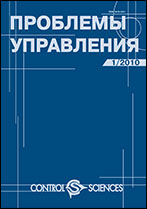|
Reviews
Distributed intelligence of multi-agent systems. Part II: Collective intelligence of social systems
Yu. L. Slovokhotovab, D. A. Novikova
a Trapeznikov Institute of Control Sciences, Russian Academy of Sciences, Moscow, Russia
b Department of Materials Science, Moscow State University, Moscow, Russia
Abstract:
Part II of the multi-part survey is devoted to the features and empirical characteristics of distributed intelligence (DI) as the capability of a collective agent (social system) to perceive, process, and use new information in order to achieve its goals. The implementations of DI in human social systems are considered: the crowd wisdom of unstructured communities and the collective intelligence of small groups, organizational systems (OSs), and big systems (states, peoples, and civilizations in historical time). Unlike the swarm intelligence of social insects and animals, collective intelligence in human communities is built up of individuals capable of deep information processing and creative activity. The tight links between the DI of human organizational and social systems and individual human intelligence are emphasized. The increasing contribution of AI to modern collective intelligence is illustrated by flexible resource management in real time. The factors determining the effectiveness of the DI of a multi-agent system are identified as follows: (a) the cognitive capabilities of individuals, (b) the structure of interactions between them, (c) collective goal-setting, (d) external information recording, compression, and processing, and (e) creation of new “images” of the environment and oneself in it. A modular perception model of external influences by an intellectual agent is discussed.
Keywords:
multi-agent social systems, collective intelligence, groups, organizational systems, big systems, modular model of perception.
Received: 06.03.2023
Revised: 11.05.2023
Accepted: 22.05.2023
Citation:
Yu. L. Slovokhotov, D. A. Novikov, “Distributed intelligence of multi-agent systems. Part II: Collective intelligence of social systems”, Probl. Upr., 2023, no. 6, 3–21; Control Sciences, 2023, no. 6, 2–17
Linking options:
https://www.mathnet.ru/eng/pu1330 https://www.mathnet.ru/eng/pu/v6/p3
|

| Statistics & downloads: |
| Abstract page: | 121 | | Full-text PDF : | 65 | | References: | 30 |
|




 Contact us:
Contact us: Terms of Use
Terms of Use
 Registration to the website
Registration to the website Logotypes
Logotypes








 Citation in format
Citation in format 